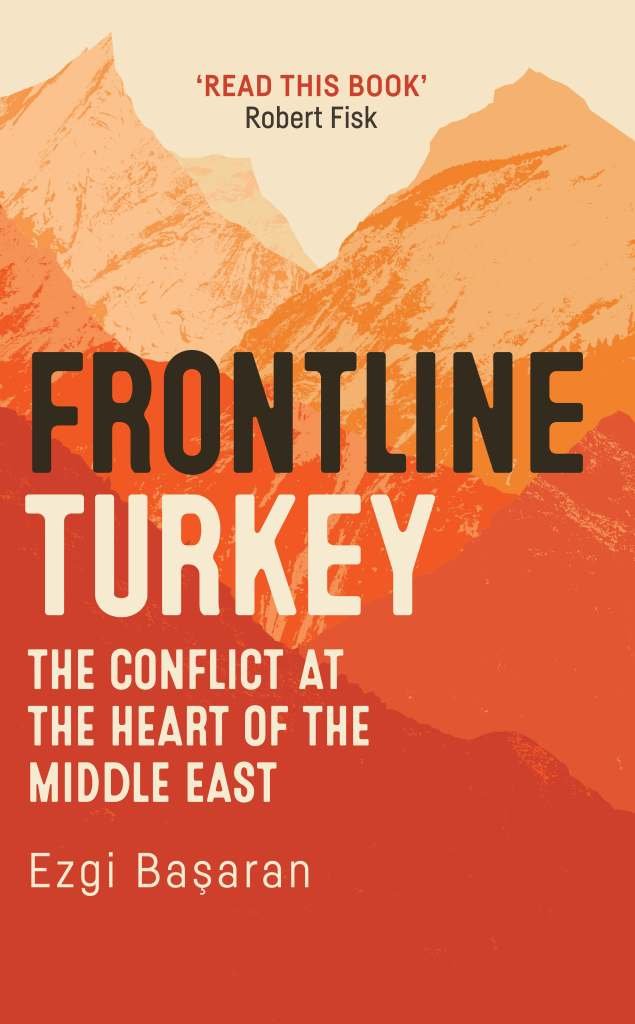Ezgi Başaran, coordinator of the Programme on Contemporary Turkey at Oxford University’s St Anthony’s College, on “Frontline Turkey: The Conflict at the Heart of the Middle East.”
The book, spanning a brisk 200 pages, offers a concise overview of the nation’s ongoing deadlock, delving into how the persistent conflict with the Kurdistan Workers’ Party (PKK) and the ascent and decline of the Gülenist network propelled authoritarianism in modern-day Turkey.
Başaran, boasting more than a decade of expertise in Turkish media, including a tenure as editor-in-chief at the now-defunct daily Radikal, engaged in a conversation with Turkey Book Talk. The discussion centered on how the breakdown of a peace initiative with the PKK in 2015 has influenced the current state of affairs and the trajectory of Turkey moving forward.
Why did you decide to write this book at this point?
The primary objective behind penning this book was to unveil the truth concerning a pivotal period in Turkey’s history. It aims to rectify the narrative regarding the deepening of Turkey’s most profound conflict, the Kurdish predicament, despite a fleeting window of opportunity for resolution. Moreover, it sheds light on how the breakdown of peace negotiations with the Kurds precipitated the erosion of Turkey’s democratic institutions.
Additionally, my intention was to present an alternative perspective on the Middle East to a non-Turkish readership. This is crucial because resolving the ongoing turmoil in the Middle East is intricately linked to Turkey’s four-decade-long Kurdish dilemma and the government’s chosen approach to address it.
Today in Turkey ultra-nationalism is at the center of government, becoming more strident by the day. It is almost surreal to recall that not so long ago a peace deal between the state and the PKK seemed to be in sight.
During my seminars on the book here in the U.K., recounting the events spanning from 2013 to 2016, beginning with the initiation of the peace process and culminating in the July 2016 coup attempt, often elicits incredulity.
It’s easy to overlook the tumultuous journey we’ve experienced, both the highs and lows. It’s surreal to think that just three years ago, Abdullah Öcalan, the incarcerated leader of the PKK, was engaged in negotiations with the chief of the National Intelligence Agency (MİT). This sentiment is particularly poignant considering that Selahattin Demirtaş, the co-chair of the Peoples’ Democratic Party (HDP) focused on the Kurdish issue, has been imprisoned for a year.
Let’s go back to the start of the peace process. It’s sometimes forgotten now but one of the reasons why the Turkish government felt nudged toward starting peace talks was because of what was going on in Syria. Ironically it was also developments in Syria that ended up collapsing the peace process.
I track events from the emergence of the Justice and Development Party (AKP) to the start of the Turkish-Kurdish peace process. The consequences of the peace process collapse are very closely related to the Syrian war. When the war in Syria first erupted, Turkey’s leadership was adamant that it would only be a matter of months before Bashar al-Assad was ousted.
That obviously didn’t happen. When it became clear that al-Assad wasn’t going anywhere soon, Turkey’s main objective in Syria shifted to obstructing the Syrian Kurdish Democratic Union Party (PYD) in its bid to form an autonomous region in northern Syria in Rojava.
Because of that, from the end of 2013 to the start of 2015, Turkey saw no problem in having an open-border policy for jihadists in Syria. This turned the country into a hub for jihadists, including ISIS recruits, and it has caused huge security vulnerabilities for Turkey and Europe.
Ankara took this course for the simple reason that the PYD is ideologically affiliated with the PKK, and an autonomous Kurdish region in Syria could be an example for the Kurds in Turkey. So, ultimately, we can say that one of the main reasons why the peace process collapsed was the expansion of Syrian Kurdish cantons on the Turkish border.
Politics was also crucial. Turkey held an election in June 2015 and the peace process was still ongoing until then. The AKP lost almost 10 percentage points of support and wasn’t able to form a parliamentary majority. Soon after that, the peace process collapsed, there was a harsh military crackdown, and when a snap election was held in November 2015, the AKP was able to rally nationalist support to return to a single-party government. Those nationalist lessons have set the course for the government ever since.
From February 2015 to July 20, 2015, I made a concerted effort to accurately depict the unfolding events, particularly focusing on the peace process’s collapse. The “Dolmabahçe meeting” in February seemed pivotal initially, but upon reflection, it became evident that the peace process was already off course.
During this time, the AKP and President Erdoğan’s narrative and actions indicated that the peace process was not serving their electoral interests; rather, it was bolstering the HDP’s position.
As I meticulously reviewed each day and announcement, it became apparent that the AKP leadership abruptly decided to abandon the peace process due to shifting political dynamics influenced by the Syrian conflict and the perceived advantage it granted the HDP. Following the June 2015 election, the AKP recalculated its approach to the Kurdish conflict.
Simultaneously, the PKK made its own miscalculations. Believing that the HDP’s success in June 2015 signaled support for the PKK, they misinterpreted public sentiment. In reality, the HDP’s victory indicated backing for the peace process and a ceasefire, not for the PKK’s agenda. Furthermore, the PKK wrongly assumed that the international support it garnered for combatting ISIS in Syria would extend to its urban warfare in Turkey post-peace process collapse. This error led to devastating urban conflicts resulting in numerous casualties and mass displacements.
Presently, Kurdish communities in Turkey find themselves disillusioned and disenchanted, feeling let down by both the PKK and the government. Despite enduring the confiscation of their mayorships by the state and witnessing their party’s co-chairs imprisoned for over a year, their voices remain largely subdued.
The government fancifully claims that the PKK was collaborating with the Gülen movement to stockpile weapons and create chaos once the peace process collapsed.
I find it highly unlikely that the Kurdish and Gülen movements would collaborate. Their history is marked by ongoing ideological and practical conflicts. Therefore, I am skeptical of the suggestion that the PKK and Gülen are allied in an effort to partition Turkey. While each group may harbor ambitions for the country’s division, I doubt they would join forces to achieve this goal.
Throughout your career, you witnessed how the Gülen movement went from being a close ally of the government to being declared a terrorist organization. Unlike many people, you were always skeptical about the Gülenists and their methods.
A: After the July 2016 coup attempt my colleagues in Western media outlets were really surprised and couldn’t believe that an Islamic cleric living in Pennsylvania could orchestrate a military coup.
It’s really hard to describe how this Sufi movement of Gülenists was able to infiltrate the state – particularly the National Intelligence Agency and the judiciary – while also building huge lobbying mechanisms in Europe, the U.K., and the U.S. It’s difficult to tell the Western world about this if they have just started reading about Turkey after the coup attempt.
Several years ago, a handful of journalists began uncovering irregularities and evidence fabrication in the significant Balyoz and Ergenekon cases. While some lauded the Gülen movement and the government as exemplars of moderate Islam and pro-business attitudes to the West, others raised concerns.
Initially, there was a tacit alliance between Erdoğan and Gülen, with Gülenists playing a pivotal role in supporting the AKP against the secular establishment during its early years. However, tensions between Erdoğan’s party and the Gülen movement escalated around 2011 as Erdoğan solidified his power within the government. The climax of this power struggle manifested in the July 15, 2016 coup attempt.
Having meticulously studied thousands of pages of indictments from the Balyoz and Ergenekon cases and conducted extensive research on the Gülen movement, I found myself targeted by them. My name appeared on a list of journalists earmarked for imprisonment during the Ergenekon case. They labeled me as a coup sympathizer and a supporter of the military establishment because I highlighted their role in fabricating evidence to incarcerate a significant portion of the army.
The Gülenists arguably pose one of the gravest threats to the Republic of Turkey since its inception. However, conveying this reality proves challenging due to the authoritarian atmosphere in Turkey, where numerous journalists and academics languish behind bars. Consequently, maintaining a nuanced narrative for Western audiences regarding the danger posed by the Gülen movement becomes increasingly difficult. Many perceive Gülen solely as a victim of an oppressive regime, overlooking the complexities of the situation.
What about the current situation in Turkey? There is a seemingly ever-stronger coalition of the religious-nationalist right wing, with the AKP teaming up with the Nationalist Movement Party (MHP) in a close alliance. It may seem very distant right now, but do you see any prospect of a return to the peace process? Could electoral calculation one day push the AKP towards returning to that path?
Erdoğan possesses remarkable political acumen, capable of swiftly reshaping narratives to his advantage. Although the discourse has taken on a notably nationalist tone, there exists a solidified 70 percent coalition on the Kurdish question, comprising secular nationalists, MHP supporters, AKP loyalists, and even some CHP voters. However, if Erdoğan genuinely desired to reinitiate a peace process, he could navigate a path forward.
Throughout his tenure, Erdoğan has adeptly utilized various channels of influence. He once leveraged the EU accession process to bolster his domestic and international standing. Employing vivid metaphors, he famously likened democracy to a train, suggesting its dispensability upon reaching one’s objectives. Initially, he viewed the Kurdish peace process as another means to his ends, only to realize it was inadvertently strengthening the Kurdish movement.
Nevertheless, Erdoğan remains firmly grounded in pragmatic political realities. Hence, it seems improbable that he will prioritize a return to peace negotiations, especially with the November 2019 presidential elections looming. Unfortunately, this suggests that we are in for a challenging journey ahead.
You Might Wanna Know About Journalism Ethics Codes for the Digital Age


